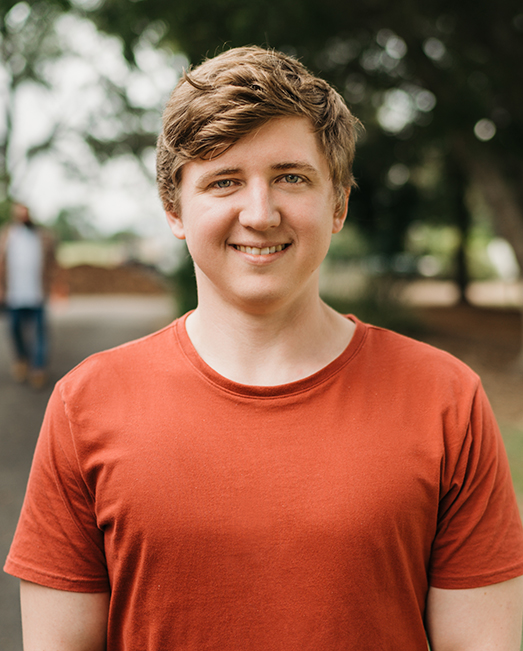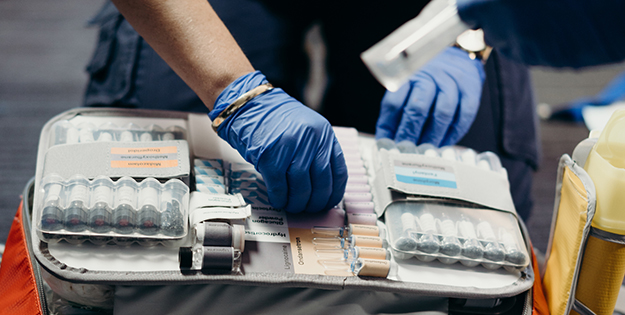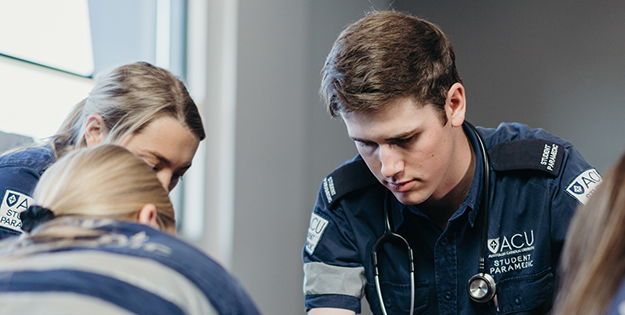Career
Copyright@ Australian Catholic University 1998-2024 | ABN 15 050 192 660 CRICOS Reg: 00004G
Copyright@ Australian Catholic University 1998-2024 | ABN 15 050 192 660 CRICOS Reg: 00004G

Let’s play a game of Guess the Job. The career in question suits those with a strong sense of civic duty. It’s a job that involves focused training in preparation for challenging and unpredictable conditions, with a high-adrenaline factor that requires an ability to remain calm in stressful situations. People in this line of work wear a uniform that is instantly recognisable, and which the wearer can be proud of.
Of course, there might be several jobs that carry at least some of the above characteristics – but two careers that definitely tick all the boxes are ‘military personnel’ and ‘paramedic’.
In the past two years, ACU has seen a 10-fold rise in student enrolments from former members of the Australian Defence Force (ADF). Remarkably, around one in four of those students are studying paramedicine, making it a popular course choice for former military personnel.
The trend has not gone unnoticed among the growing legion of student veterans at ACU.
“It’s a very common topic of discussion on campus,” says Stephen Powter, an army veteran and final-year paramedicine student at ACU’s Brisbane Campus.
“I think everyone’s initially surprised when they get to university and so many paramedicine students are veterans, but when you think about it, it does make a lot of sense.”
Just like soldiers in combat, paramedics occasionally find themselves in volatile situations that are fast-moving and variable. While many of us would waver in these critical scenarios, paramedics are trained to stay calm and focused so they can deal with whatever is in front of them.
“Paramedicine does align very closely with what is common for people in the military, in that you go through a process of intensive training that prepares for a work profile that doesn’t have a lot of certainty in it,” says former Army Colonel Andrew Condon, ACU’s Industry Professor for Veterans and Their Families.
“So you spend a lot of time training, preparing and practicing for the worst-case scenario – in the military, that might be conflict or a natural disaster; in paramedicine, it might be a serious accident or a mass casualty incident – and in both cases, that might not happen very often, but you train just in case, and when the time comes to do your job, you’re prepared to do it as best as possible.”

Thanks partly to these similarities, paramedicine is proving to be an attractive option for many veterans looking to transition to a new career.
“I think the synergies are pretty clear,” says Stephen Powter, “because we do all this training and practice and theory, and the idea is that it prepares us for these situations, which of course it does, but even so, every time I’ve been on a paramedicine placement, it’s been like, ‘Woah, what’s going on out here!’ I had similar experiences in the army, and I think that unpredictability holds an attraction to many veterans.”
Stephen joined the military in 2014 and served as an artillery observer based in Darwin until he left the service in 2019. He found the transition to civilian life challenging, as do many veterans.
“I knew it was going to be hard but I was surprised at how challenging it was – it took at least a year to let go of the ‘green’ and settle into a new direction and focus.”
In 2020, he enrolled in a Bachelor of Paramedicine at ACU, identifying it as the profession that most matched his skills and interests.
“I knew I wanted to do something in healthcare, to help people and to be challenged, and I guess the thing that brought me into paramedicine was that little bit of an adrenaline rush it has,” Stephen says.
“I was seeking something similar to the army, where you sometimes find yourself in these wild situations that you don’t get in many other jobs, but I was seeking it totally unconsciously. It was only when I got here [to university] that I realised why and how I arrived at paramedicine.”
Other ACU paramedicine students have cited a sense of purpose and a desire to help people as things that drew them to their new career.
Take Joel Hartgrove, who enrolled in a Bachelor of Paramedicine in 2021 after he was medically discharged from the army with a chronic injury. After completing his first placement as part of his ACU course, Joel discovered a love for the team-based ethos of the ambulance service – something he missed after leaving the ADF.
“There’s also a sense of pride in doing something to help people,” he says. “I had a lot of pride every day when I would put on the Australian Army uniform, and for me, it would be the same feeling, putting on the paramedic uniform and doing something useful and important.”
The talk of pride and belonging is familiar to Industry Professor Andrew Condon. Since joining ACU in early 2022, he has had conversations with many student veterans who’ve discovered a renewed sense of purpose in their pathway.

“There’s a sense of service and a sense of respect associated with paramedicine that veterans find attractive, and it’s also clear that just being on campus and being part of a student community often allows them to develop a new identity and a new sense of belonging,” he says, while emphasising the important role that universities play in supporting veterans to make successful transitions.
Since 2020, ACU’s Veteran Entry Program has assessed military service and converted it to an higher education entry rank, allowing many more veterans to study at university.
“I recall a conversation with one particular veteran who during his transition from service thought he’d spend the rest of his life working in a warehouse because he didn’t have an ATAR,” says Condon, who served in the army for almost three decades.
“When he discovered through a friend that ACU would recognise his military training and give him a pathway to another career, he immediately decided to become a paramedic and he couldn’t be happier. It’s like he was given a second chance in life.
“For me, that just speaks to the whole mission of ACU, in that it’s empowering these young people to take higher education pathways into careers that allow them to make a difference – whether it’s paramedicine or other careers like nursing or teaching.”
With further growth in student veteran numbers forecast at ACU in years to come, it is anticipated that the university will produce many more graduates in paramedicine and other healthcare careers.
That includes nursing, which has also proven popular among former military personnel. Of the veterans currently enrolled at ACU, 71 per cent are studying courses with the Faculty of Health Sciences.
As for paramedicine student and former soldier Stephen Powter, he recently accepted an offer to work with the London Ambulance Service, which is known as one of the busiest ambulance services in the world. He cites his former life in the military as crucial in giving him the confidence to hit the road in such a demanding work environment.
“I think that’s another example of the army in me coming to the surface,” he says. “Just wanting to be thrown straight into the deep end and go as hard as I can. I certainly won’t be having many quiet days, that’s for sure – and that suits me just fine.”
Are you a current or former member of the Australian Defence Force who is keen to pursue university study? Explore your options at ACU.
Copyright@ Australian Catholic University 1998-2024 | ABN 15 050 192 660 CRICOS Reg: 00004G